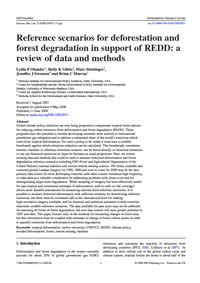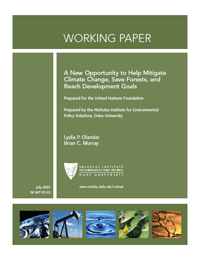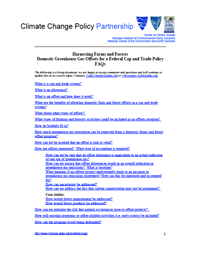Publications
Reference Scenarios for Deforestation and Forest Degradation in Support of REDD: A Review of Data and Methods
Global climate policy initiatives are now being proposed to compensate tropical forest nations for reducing carbon emissions from deforestation and forest degradation (REDD). Here, we review existing data and methods that could be used to measure historical deforestation and forest degradation reference scenerios.
A Core Participation Requirement for Creation of a REDD market
Current proposals for including reduced emissions from deforestation and degradation (REDD) in an international climate agreement go beyond the requirements of the Clean Development Mechanism by advancing national or subnational level accounting, which addresses concerns about project-level leakage. One of the remaining challenges of including REDD in the international trading of greenhouse gas allowances is concern over international leakage. Our research shows that international leakage potential can be quite high if only a small portion of the potential REDD sources are participating.
Designing Offsets Policy for the U.S.
This report covers the principles, challenges and options for encouraging domestic and international emissions reductions and sequestration from uncapped entities as part of a Federal cap-and-trade system for greenhouse gases.
Data and Methods to Estimate National Historical Deforestation Baselines in Support of UNFCCC REDD
Global climate policy initiatives are now being proposed to compensate tropical forest nations for reducing carbon emission from deforestation and forest degradation (REDD). These proposals have the potential to include developing countries more actively in international greenhouse gas mitigation and to addres a substantial share of the world's emissions that come from tropical deforestation. For such a policy to be viable it must have a credible benchmark against which emissions reduction can be calculated. This benchmark, sometimes termed a baseline or reference scenario, can be based directly on historical emission or can use historial emissions as input for business as usual projections. Here, we review existing data and methods that could be used to measure historical deforestation and degradation baselines.
A New Opportunity to Help Mitigate Climate Change, Save Forests, and Reach Development Goals
A new proposal by developing nations to include reducing emissions from deforestation (REDD) in the United Nations Framework Convention on Climate Change is moving forward and could provide an unprecedented level of funding for forest conservation and development objections. It has the potential to jointly address climate change, forest conservation and development objectives.
Harnessing Farms and Forests Domestic Greenhouse Gas Offsets for a Federal Cap and Trade Policy FAQs
This primer answers questions about domestic greenhouse gas offsets for a federal cap-and-trade policy.
Establishing Credible Baselines for Quantifying Avoided Carbon Emissions from Reduced Deforestation and Forest Degradation
Global climate policy initiatives are now being proposed to compensate tropical forest nations for reducing the emissions of carbon from deforestation and forest degradation. This effort has the potential to include developing countries more actively in international greenhouse gas mitigation and to address a substantial share of the world’s emissions which come from deforestation. A baseline is an essential precursor to a viable and robust international compensation scheme for reduced emissions from degradation and deforestation (REDD). Baselines provide a benchmark against which emissions reduction can be calculated.







